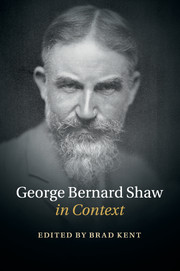Book contents
- Frontmatter
- Dedication
- Contents
- List of illustrations
- Notes on contributors
- Preface
- Acknowledgements
- A Chronology of Shaw's Works
- List of abbreviations
- PART I PEOPLE AND PLACES
- PART II THEATRE
- PART III WRITING AND THE ARTS
- PART IV POLITICS
- 24 Censorship
- 25 Empire and nationalism
- 26 Feminism
- 27 Irish politics
- 28 Socialism
- 29 Totalitarianism
- 30 War
- PART V CULTURE AND SOCIETY
- PART VI RECEPTION AND AFTERLIFE
- Further reading
- Index
- References
27 - Irish politics
from PART IV - POLITICS
Published online by Cambridge University Press: 05 October 2015
- Frontmatter
- Dedication
- Contents
- List of illustrations
- Notes on contributors
- Preface
- Acknowledgements
- A Chronology of Shaw's Works
- List of abbreviations
- PART I PEOPLE AND PLACES
- PART II THEATRE
- PART III WRITING AND THE ARTS
- PART IV POLITICS
- 24 Censorship
- 25 Empire and nationalism
- 26 Feminism
- 27 Irish politics
- 28 Socialism
- 29 Totalitarianism
- 30 War
- PART V CULTURE AND SOCIETY
- PART VI RECEPTION AND AFTERLIFE
- Further reading
- Index
- References
Summary
Although he left Ireland in April 1876, short of his twentieth birthday, Bernard Shaw remained abreast of and engaged with Ireland's politics for most of his ninety-four years. He wrote many essays on the subject, delivered important political speeches at key historical moments, and became acquainted with as advisor or provocateur to some of Ireland's leading political figures during the struggle for Irish independence – all in addition to writing important Irish plays. Shaw's Irish politics evolved as his ideologies evolved, even influencing his turn from British democracy.
In 1937, Shaw recalled that his childhood encounters with Dublin's destitution ‘laid the foundation of my lifelong hatred of poverty, and the devotion of all my public life to the task of exterminating the poor and rendering their resurrection for ever impossible’. With revulsion for Dublin's poverty, Shaw left in 1876 for London and its opportunities – which he found with the Fabian Society in 1884. Once a Fabian, he began to emerge as a socialist activist delivering speeches and eventually essays. True to his internationalist socialism, consistent with his life-long aversion to fanatical nationalism, Shaw spoke on the Fabian's philosophy of educating the middle-class toward change – but touched on Ireland: ‘If socialism be not made respectable and formidable by the support of our class – if it be entirely left to the poor, then the proprietors will attempt to suppress it by such measures as they have already taken in … Ireland. Dynamite will follow. Terror will follow dynamite. Cruelty will follow terror’. Shaw's Irish allusions reflected the 1881 American-Irish sponsored Fenian dynamite campaign and the terror killings of Britain's Chief Secretary and Under Secretary for Ireland by the Dublin Invincibles. His commentary suggested that poverty was at the heart of the matter. The 1880s decade of terror prompted William Gladstone's Liberal government to introduce the first Irish Home Rule Bill in 1886. Its defeat led to the rise to power of Lord Salisbury's Conservative government, which pursued coercion for Ireland.
Even near the end of the decade, when Shaw occasionally wrote political material for London's The Star newspaper, edited by Irish Party MP T. P. O'Connor to facilitate the return of a Liberal Government, Shaw resisted the paper's Home Rule agenda. For Shaw, that agenda lacked social change.
- Type
- Chapter
- Information
- George Bernard Shaw in Context , pp. 222 - 229Publisher: Cambridge University PressPrint publication year: 2015

